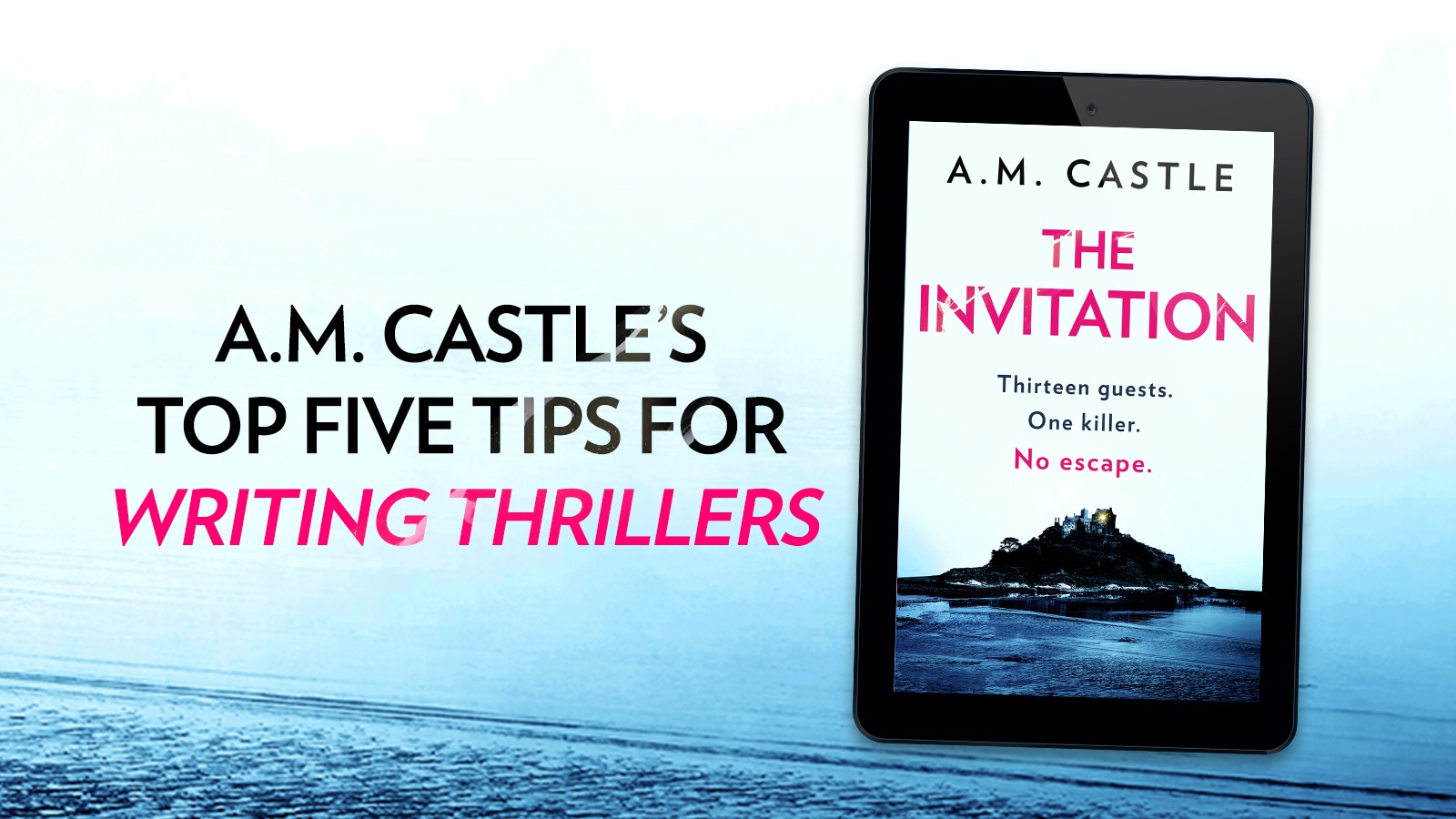Are you trying to write a thriller but have no clue where to begin? Are you looking for some writing advice? Have no fear, A.M. Castle is here! The author of The Invitation, the upcoming new locked mystery, is here to share her top five tips for writing thrillers.
5 Top Tips for Writing Thrillers, by A.M. Castle
People often ask me how I get my ideas, and I’m always happy to tell them how they pop into my head – but in fact the idea is just the beginning of the journey when you’re writing thrillers.
1. The Three C’s
Dan Brown, author of the Da Vinci Code, puts it brilliantly when he says there are three Cs you need to write a good thriller: the contract, the clock and the crucible. The contract is the promise you make to the reader at the beginning of your story. In The Invitation, it’s the idea that thirteen people are gathering on a remote island for a reunion, twenty years after uni, and that something is going to go badly wrong. No spoilers, but the clock quickly starts ticking, and the place where they find themselves, a remote Cornish island cut off from the mainland, rapidly becomes the crucible in which they are all tested.
2. A Comfortable Chair
Once you’ve got your three Cs, you’ll need something else – and it’s another C. A comfortable chair is a vital part of a writer’s armoury. It takes a long time to write a book, and sitting in front of a screen for long periods of time is an inevitability, unless you’re lucky enough, like the late Dame Barbara Cartland, to be able to lie on a chaise longue while dictating your story to a long-suffering secretary. Failing that, Ikea has some great office-type chairs, now that we’re all working from home.
3. Blank Documents
Some people swear by various types of software which are supposed to help with the writing process. There are lots of these, like Scrivener, Ulysses and Vellum. I’m afraid I’m a believer in making things easy. To write, you need a blank document on your PC, tablet or even phone, and some discipline. In the time it takes you to get used to your swanky new writing software, you could have sketched out your synopsis and got on with your first chapter. But maybe I’m biased – I once tried to use a writing programme and it crashed, taking my half-written novel with it. Never again, thanks very much. But do give it a try if you think it could help you.
4. Routine
Routine. This one sounds counter-intuitive – surely routine is the very opposite of creativity? In many ways I’d agree. But, when I’ve been struck by a brilliant notion while driving in my car or having a shower, I’ve always tended to forget the most salient bits by the time I can write things down. So I’ve trained my creative mind to be at its most open during certain times of the day. For me, the morning is most productive, even though I’m by no means a morning person. So I sit down every day and start to write, remaining open to anything that comes my way. I feel my role is to be in the right place at the right time when ideas come to call. I don’t feel this is reining in my creativity, but rather giving it the importance and space it deserves.
5. The terrible first draft…
My editor will probably hate me saying this, but don’t be afraid to write a terrible first draft. I dislike editing as much as the next writer, but it’s a truism that nothing comes from nothing. You need to get something down in order to make it better. Words on a page are always better than than the daunting horror of a blank document. Like clay, words can be moulded, refined and always, always improved. When your first draft is written, you might finally realise you’ve written it in the wrong order. I sometimes find a chapter I thought was a great middle section actually works best at the beginning, to plunge readers into the action. Likewise, watch where you put your chapter breaks. You can create huge amounts of tension by leaving people wondering who has just come into the room… or who has sneaked out, unseen…
Good luck with your writing journey. I always try to remember that writing is a marathon not a sprint; a little a day adds up and you will end up with something workable as long as you stick at it. It took me about three months to write the first draft of The Invitation – and it was only then that the hard work really began. Sometimes the editing process puts you right off a book, but with this one, I can honestly say I’m still madly in love with the story. But, of course, I’m not standing still. I’m already at work on my next novel, set in… well, you’ll soon find out where. Needless to say, there’ll be a contract, a clock and a crucible in it. And I’m already sitting on my nice comfy chair.
If you’re into thrillers why not read The Invitation by A.M. Castle? This gripping psychological thriller is out Friday 26th March. Pre-order here.
Looking for some thriller recommendations? Why not read A.M. Castle’s top five thrillers that inspired The Invitation? Click here to read.



